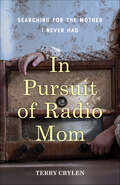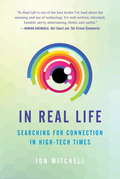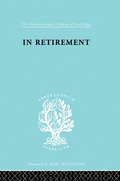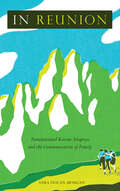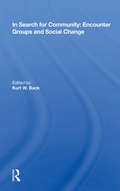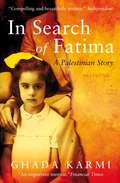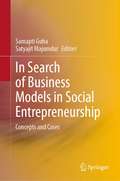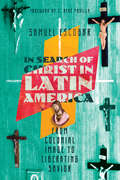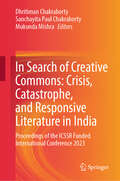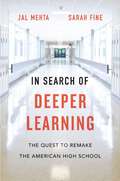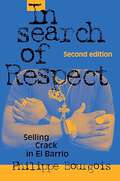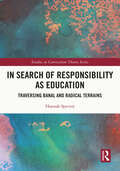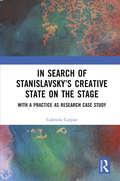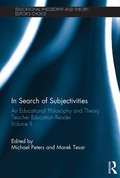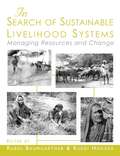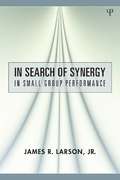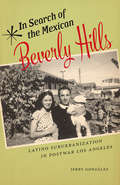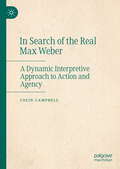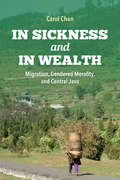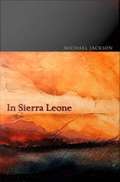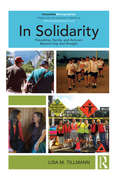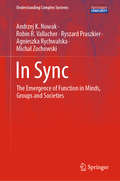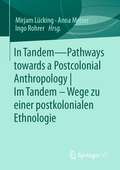- Table View
- List View
In Pursuit of Radio Mom: Searching for the Mother I Never Had
by Terry CrylenIn Pursuit of Radio Mom brings the reader tight to Terry Crylen’s side as it traces her path from frequent and debilitating anxiety, loneliness, and shame—and a dysfunctional marriage that mirrors the dynamics of her relationship with her mother—to the discovery of her authentic self and the happiness and fulfillment such a transformation brings. Radio Mom also illuminates the ways in which one generation impacts the next—both wittingly and unwittingly—when later, while pressing along the difficult route of raising her own daughter, the author is challenged to confront, yet again, the legacy of her past. A book that also makes transparent the process of psychotherapy, In Pursuit of Radio Mom’s message is this: the excavation of pain clears space within the mind and heart—affording the growth of new insight, overturning fear, and making acceptance and forgiveness possible.
In Real Life
by Jon MitchellTechnology helps us with our hardest work. It can also offer us endless distractions. Can technology enable us, as individuals and communities, to do our greatest possible work, the hard work of being a good person?Jon Mitchell sets out to identify and explore the ways in which we can develop a more thoughtful relationship with technology. Rather than using technology as a medium for connecting with the world, he recommends we rethink our relationship with technology, using it as a resource that allows us to have a more intimate and personal relationship with the world around us, nature, and our loved ones. Mitchell offers concrete practices for the way we use technology in our daily lives.With an accessible and conversational, easy-to-read style, Mitchell uses his years of experience as both a tech journalist and a mindfulness practitioner, to propose a rethinking of both the design of technology and its use.
In Real Life: Searching for Connection in High-Tech Times
by Jon MitchellTechnology can help us with some of our most difficult work. It can also offer us endless distractions. Can technology help us, as individuals and communities, in our most important task, that of being a good person?Jon Mitchell sets out to identify and explore the ways in which we can develop a more thoughtful relationship with technology. Rather than only using our technological devices as a medium for connecting with the world, he recommends we rethink our relationship with technology, and see it as a resource that allows us to have a more intimate and personal relationship with ourselves and the world around us. Mitchell offers concrete practices for streamlining and improving the way we use technology in our daily lives.Writing in a relatable, conversational, easy-to-read style, Mitchell draws on his years of experience as a tech journalist and mindfulness practitioner to propose a rethinking of both the design of technology and its use.
In Retirement (International Library of Sociology)
by H.E. BraceyThis is Volume XII of twenty-one in a series on the Sociology of Gender and the Family. Originally published in 1966, this study on retirement looks at pensioners in Great Britain and the United States.
In Reunion: Transnational Korean Adoptees and the Communication of Family
by Sara Docan-Morgan“Do you know your real parents?” is a question many adoptees are asked. In In Reunion, Sara Docan-Morgan probes the basic notions of family, adoption, and parenthood by exploring initial meetings and ongoing relationships that transnational Korean adoptees have had with their birth parents and other birth family members. Drawing from qualitative interviews with adult Korean adoptees in the United States and Denmark, as well as her own experiences as an adoptee, Docan-Morgan illuminates the complexities of communication surrounding reunion. The paradoxes of adoption and reunion—shared history without blood relations, and blood relations without shared history—generate questions: What does it mean to be “family”? How do people use communication to constitute family relationships? How are family relationships created, maintained, and negotiated over time? In Reunion details adoptive and cultural identities, highlighting how adoptees often end up shouldering communicative responsibility in their family relationships. Interviews reveal how adoptees navigate birth family relationships across language and culture while also attempting to maintain relationships with their adoptive family members. Docan-Morgan details the challenges, rewards, and contradictions of reunion. She also offers practical recommendations for transnational adoptees in reunion, adoptees considering reunion, adoptive families, and adoption practitioners. In tracing the stories of the intercultural dynamics inherent in adoptees’ reunions, Docan-Morgan demonstrates the effort, flexibility, empathy, self-reflection, and time required to navigate long-term relationships with birth families.
In Search For Community: Encounter Groups And Social Change
by Kurt W. BackThis book consists of papers presented at two symposia at AAAS Annual meetings. It enables us to evaluate the new groups and techniques in comparison with other phenomena in the society and with rituals in other societies and times, clearly placing them in the history of ideas.
In Search Of Fatima: A Palestinian Story
by Ghada KarmiGhada Karmi's acclaimed memoir relates her childhood in Palestine, flight to Britain after the catastrophe, and coming of age in Golders Green, the north London Jewish suburb. A powerful biographical story, In Search of Fatima reflects the author's personal experiences of displacement and loss against a backdrop of the major political events which have shaped conflict in the Middle East. Speaking for the millions of displaced people worldwide who have lived suspended between their old and new countries, fitting into neither, this is an intimate, nuanced exploration of the subtler privations of psychological displacement and loss of identity.
In Search of Business Models in Social Entrepreneurship: Concepts and Cases
by Satyajit Majumdar Samapti GuhaThis book discusses different innovative business models adopted by social enterprises to bring about social change in terms of creating capabilities among the marginalised section of people. These models also bring the sustainability of the enterprises to serve the people continuously. Establishing a theoretical base for further research in the area of business models in social entrepreneurship, the book consists of research work from various disciplines from scholars with experience and insights on social entrepreneurship, and who discuss one or more aspect(s) of business model, presenting their work with sound research methodologies. The book takes a broader view of the concept – a) social entrepreneurs are driven by social value and justice, b) social entrepreneur may or may not have a market orientation, c) social entrepreneurs solve variety of social problems such as poverty, health, illiteracy, environmental degradation using the principles of business and with the help of social innovation, and d) social enterprise focus on bringing social change by creating social impact.Chapters of this book are divided into three core themes. The first one – Concepts, Patterns and Values – includes contributions related to sustainable development, business model and vale creation in the context of social entrepreneurship, innovation and cross-cultural influence on business models aspects. The chapter of second theme – Enablers and Influencers – discuss role of corporate in promoting social entrepreneurship as a social responsibility, social entrepreneurship and value creation, BoP market, supply chain, structural and infrastructural choices, family as a stakeholder of indigenous enterprise, and women entrepreneurship. The third and final theme – Innovation – addresses social, open innovation and business model innovations, IPR, firm performance, collaboration and alliance, software and biotechnology industries, decision logic behind social enterprise creation, and strategy and strategic philanthropy concepts. Containing contributions from academia, industry professionals, investors, policy-makers, and other professionals, all from multiple disciplines, the book would interest the same vast audience.
In Search of Christ in Latin America: From Colonial Image to Liberating Savior
by Samuel EscobarNoted theologian Samuel Escobar offers a magisterial survey and study of Christology in Latin America. Starting with the first Spanish influence and moving through popular religiosity and liberationist themes in Catholic and Protestant thought of the twentieth and twenty-first centuries, In Search of Christ in Latin America culminates in an important description of the work of the Latin American Theological Fraternity (FTL). Escobar chronologically traces the journey of Latin American Christology and describes the milestones along the way toward a rich understanding of the spiritual reality and powerful message of Jesus. IVP Academic is pleased to release this important work, originally published in Spanish as En busca de Cristo en América Latina, for the first time in English. Offers theological, historical, and cultural analysis of Latin American understandings of Christ Discusses the sixteenth-century Spanish Christ, popular religiosity, and developed theological reflection Covers the full spectrum of theological traditions in Latin America Examines the figure of Jesus Christ in the context of Latin American culture of the twentieth century Places liberation theology within its social and revolutionary context
In Search of Creative Commons: Proceedings of the ICSSR Funded International Conference 2023
by Mukunda Mishra Dhritiman Chakraborty Sanchayita Paul ChakrabortyThis book contains selected papers presented at the international conference titled 'In Search of Creative Commons: Crisis, Catastrophe, and Responsive Literature in India', held at the Abid Ali Khan Centre for Digital Archive and Translation of Cultures, Gour Mahavidyalaya (College) from 31 August to 2 September, 2023 in collaboration with the Department of English, Dr. Meghnad Saha College. The conference was funded by the Indian Council of Social Science Research (ICSSR). In this book, three basic questions are considered. First, as humans try to live in-and-through catastrophes and exceptional situations in the contemporary world, what new perspective can literature as a creative form offer for healing and restorative purposes? Second, what new idioms and narrative styles, massive crises such as famine, partition, migration, the decimation of forests, rivers, and the disappearance of villages held up in creative articulations in colonial and postcolonial times in India? Can these representations be called “responsive literature”? Further, and this is the third major contention of this book, how can responsive literature be thought of as a conceptual category? What new transdisciplinary optic should be adopted to go beyond the limits of the “literary” and eventually include the “non-literary”? The objective of these discussions was to contribute to the larger discursive literature on disaster studies, which we believe has been excessively hegemonized by concepts from the West. By bringing in indigenous ideas from Bhasa Sahitya (language and literature), the images of samaj (society), samata (equity), and ahimsa (non-violence), the existing literature on catastrophe and crisis studies can finally be decolonized.
In Search of Deeper Learning: The Quest to Remake the American High School
by Jal MehtaAn award-winning professor and an accomplished educator, Jal Mehta and Sarah Fine take us beyond the hype of reform and inside some of America’s most innovative classrooms to show what is working—and what isn’t. In a world where test scores have been king, this boldly humanistic book offers a rich account of what education can be at its best.
In Search of Respect
by Philippe BourgoisPhilippe Bourgois's ethnographic study of social marginalization in inner-city America, won critical acclaim when it was first published in 1995. For the first time, an anthropologist had managed to gain the trust and long-term friendship of street-level drug dealers in one of the roughest ghetto neighborhoods--East Harlem. This new edition adds a prologue describing the major dynamics that have altered life on the streets of East Harlem in the seven years since the first edition. In a new epilogue Bourgois brings up to date the stories of the people--Primo, Caesat, Luis, Tony, Candy--who readers come to know in this remarkable window onto the world of the inner city drug trade. Philippe Bourgois is Professor and Chair of the Department of Anthropology, History and Social Medicine at the University of California, San Francisco. He has conducted fieldwork in Central America on ethnicity and social unrest and is the author of Ethnicity at Work: Divided Labor on a Central American Banana Plantation (Johns Hopkins University Press, 1989). He is writing a book on homeless heroin addicts in San Francisco. 1/e hb ISBN (1996) 0-521-43518-8 1/e pb ISBN (1996) 0-521-57460-9
In Search of Responsibility as Education: Traversing Banal and Radical Terrains (Studies in Curriculum Theory Series)
by Hannah SpectorNot to be conflated with systems of accountability, this book examines responsibility as a subject of educational inquiry. The author argues that responsibility in its most radical sense is not connected to a higher authority. Rather, responsibility summons the actor to do the right thing when no one else is there to announce what is right; it involves speaking the truth in a world that is increasingly characterized by organized lying and organized irresponsibility. The search for responsibility as education is explored through a wide range of issues including: studying the ways in which the bureaucratization of the world undermine ethical consciousness; cultivating the ethical imagination in education which is not only vital to sustaining democracy, but to counteracting indifference to crimes against humanity and crimes against the planet; critiquing the imperial nationalism of a wave of education legislation requiring American schools to provide instruction on genocides and other mass atrocities that take place by ‘others’ and ‘abroad’ but not at ‘home’ or by ‘us’; centralizing a curriculum of common sense in an era marked by a breakdown of common sense and disinformation narratives; and facing a reality that can never be experienced: the end of the world. Reimagining education as an avenue for cultivating personal responsibility and global justice, this text will be of interest to students, scholars, and researchers working in curriculum studies, philosophy of education, educational policy, and teacher education.
In Search of Stanislavsky’s Creative State on the Stage: With a Practice as Research Case Study
by Gabriela CurpanThis book rediscovers a spiritual way of preparing the actor towards experiencing that ineffable artistic creativity defined by Konstantin Stanislavski as the creative state. Filtered through the lens of his unaddressed Christian Orthodox background, as well as his yogic or Hindu interest, the practical work followed the odyssey of the artist, from being oneself towards becoming the character, being structured in three major horizontal stages and developed on another three vertical, interconnected levels. Throughout the book, Gabriela Curpan aims to question both the cartesian approach to acting and the realist-psychological line, generally viewed as the only features of Stanislavski’s work. This book will be of great interest to theatre and performance academics as well as practitioners in the fields of acting and directing.
In Search of Subjectivities: An Educational Philosophy and Theory Teacher Education Reader, Volume II (Educational Philosophy and Theory: Editor’s Choice)
by Michael A Peters Marek TesarWhile traditionally identified as a practice-based endeavour, the many dimensions of teacher education raise important philosophical issues that emphasise the centrality of ethics to questions of relationality and professional practice. This second volume of the Educational Philosophy and Theory reader series demonstrates the continuing relevance of philosophical approaches to the field of teacher education. The collection of texts focuses on a wide range of topics, including teacher education in a cross-cultural context, the notion of unsuccessful teaching, democratic teacher education, the reflective teacher, the ethics and politics of teacher identity, and subjectivity and performance in teaching. Chapters also explore teacher education based on experiential learning as 'experience', demonstrating the continuing relevance of philosophical approaches to the field. In Search of Subjectivities will interest academics, researchers and postgraduate students in the fields of philosophy of education, philosophy, education, educational theory, teacher education, experiential philosophy, ethics, policy and politics of education, and professional practice.
In Search of Sustainable Livelihood Systems: Managing Resources and Change
by Ruedi Baumgartner and Ruedi Högger`What a pleasure to find, at long last, a book on rural livelihoods which does not package sustainability through the straightjacket of assessment, numbers and capital′ - Development and Change Livelihood systems are much more than sets of material and economic conditions. They have to cater to a large number of human needs including food and shelter. The contributors to this important volume adopt a holistic approach to understanding rural livelihood systems. They maintain that a livelihood system embraces not just economic conditions for physical subsistence, but all the elements that provide material continuity and cultural meaning to the life of a family in a community. This book tries to understand `rural livelihood systems′ from different angles and throws light on the question of what people need in order to feel secure within their systems.
In Search of Synergy in Small Group Performance
by James R. Larson, Jr.This volume critically evaluates more than a century of empirical research on the effectiveness of small, task-performing groups, and offers a fresh look at the costs and benefits of collaborative work arrangements. The central question taken up by this book is whether -- and under what conditions -- interaction among group members leads to better performance than would otherwise be achieved simply by combining the separate efforts of an equal number of people who work independently. This question is considered with respect to a range of tasks (idea-generation, problem solving, judgment, and decision-making) and from several different process perspectives (learning and memory, motivation, and member diversity). As a framework for assessing the empirical literature, the book introduces the concept of 'synergy.' Synergy refers to an objective gain in performance that is attributable to group interaction. Further, it distinguishes between weak and strong synergy, which are performance gains of different magnitude. The book highlights the currently available empirical evidence for both weak and strong synergy, identifies the conditions that seem necessary to produce each, and suggests where the search for synergy might best be directed in the future. The book is at once a high-level introduction to the field, a review of the field's history, and a scholarly critique of the current state-of-the-art. As such, it is essential reading for graduate students, advanced undergraduate students, and researchers interested in group dynamics generally -- and small group performance in particular.
In Search of the Mexican Beverly Hills: Transnational Cultures in the United States)
by Jerry GonzálezResidential and industrial sprawl changed more than the political landscape of postwar Los Angeles. It expanded the employment and living opportunities for millions of Angelinos into new suburbs. In Search of the Mexican Beverly Hills examines the struggle for inclusion into this exclusive world—a multilayered process by which Mexican Americans moved out of the barrios and emerged as a majority population in the San Gabriel Valley—and the impact that movement had on collective racial and class identity. Contrary to the assimilation processes experienced by most Euro-Americans, Mexican Americans did not graduate to whiteness on the basis of their suburban residence. Rather, In Search of the Mexican Beverly Hills illuminates how Mexican American racial and class identity were both reinforced by and took on added metropolitan and transnational dimensions in the city during the second half of the twentieth century.
In Search of the New Woman: Middle-Class Women and Work in Britain 1870-1914
by Gillian SutherlandThe 'New Women' of late nineteenth-century Britain were seen as defying society's conventions. Studying this phenomenon from its origins in the 1870s to the outbreak of the Great War, Gillian Sutherland examines whether women really had the economic freedom to challenge norms relating to work, political action, love and marriage, and surveys literary and pictorial representations of the New Woman. She considers the proportion of middle-class women who were in employment and the work they did, and compares the different experiences of women who went to Oxbridge and those who went to other universities. Juxtaposing them against the period's rapidly expanding but seldom studied groups of women white-collar workers, the book pays particular attention to clerks and teachers and their political engagement. It also explores the dividing lines between ladies and women, the significance of respectability and the interactions of class, status and gender lying behind such distinctions.
In Search of the Real Max Weber: A Dynamic Interpretive Approach to Action and Agency
by Colin CampbellThis book uses the contrast between the theoretical positions of the two Max Webers - that is the Weber of the Protestant Ethic thesis and the Weber of the theory of action – as the basis for developing a theory of agency and an associated dynamic interpretive approach to action. The book critiques traditional theories of action for neglecting the physical dimension, for conflating agency with action, and contrasting the latter with behaviour. It argues that action is not just cerebral or communicative but inherently tied to effort, emotion, and imagination, with voluntarism understood in terms of attention instead of intention, and the exercise of will rather than choice. This is the basis of a "dynamic interpretivist" approach, one that integrates behavioural insights with interpretive sociology, highlighting how actors actively maintain their power of agency. The concept of "character" is also introduced as a crucial link between individual agency, ethical values, and cultural systems. This book will be of interest to researchers and students of sociology, anthropology, media studies, and criminology, as well as social theorists.
In Sickness and in Wealth: Migration, Gendered Morality, and Central Java (Framing the Global)
by Carol ChanVillagers in Indonesia hear a steady stream of stories about the injuries, abuses, and even deaths suffered by those who migrate in search of work. So why do hundreds of thousands of Indonesian workers continue to migrate every year? Carol Chan explores this question from the perspective of the origin community and provides a fascinating look at how gender, faith, and shame shape these decisions to migrate. Villagers evaluate men's and women’s migrations differently, leading to different ideas about which kinds of human or financial flows should be encouraged and which should be discouraged or even criminalized. Despite routine and well-documented instances of exploitation of Indonesian migrant workers, some villagers still emphasize that a migrant's success or failure ultimately depends on that individual’s morality, fate, and destiny. Indonesian villagers construct strategies for avoiding migration-related risks that are closely linked to faith and belief in supernatural agency. These strategies shape the flow of migration from the country and help to ensure the continued confidence Indonesian people have in migration as an act of promise and hope.
In Sierra Leone
by Michael JacksonIn 2002, as Sierra Leone prepared to announce the end of its brutal civil war, the distinguished anthropologist, poet, and novelist Michael Jackson returned to the country where he had intermittently lived and worked as an ethnographer since 1969. While his initial concern was to help his old friend Sewa Bockarie (S. B. ) Marah--a prominent figure in Sierra Leonean politics--write his autobiography, Jackson's experiences during his stay led him to create a more complex work: In Sierra Leone, a beautifully rendered mosaic integrating S. B. 's moving stories with personal reflections, ethnographic digressions, and meditations on history and violence. Though the Revolutionary United Front (R. U. F. ) ostensibly fought its war (1991-2002) against corrupt government, the people of Sierra Leone were its victims. By the time the war was over, more than fifty thousand were dead, thousands more had been maimed, and over one million were displaced. Jackson relates the stories of political leaders and ordinary people trying to salvage their lives and livelihoods in the aftermath of cataclysmic violence. Combining these with his own knowledge of African folklore, history, and politics and with S. B. 's bittersweet memories--of his family's rich heritage, his imprisonment as a political detainee, and his position in several of Sierra Leone's post-independence governments--Jackson has created a work of elegiac, literary, and philosophical power.
In Solidarity: Friendship, Family, and Activism Beyond Gay and Straight
by Lisa TillmannIn Solidarity: Friendship, Family, and Activism Beyond Gay and Straight shows what being an ally (in this case to LGBTQ+ persons and communities) requires, means, and does. Through prose, poetry, performance text, and film, the work takes readers inside relationships across sexual orientation and serves as an exemplar of activist scholarship. In Solidarity makes a unique and compelling contribution to courses on LGBTQ+ studies, sexualities, gender, identity, relationships, or the family.
In Sync: The Emergence of Function in Minds, Groups and Societies (Understanding Complex Systems)
by Ryszard Praszkier Robin R. Vallacher Agnieszka Rychwalska Andrzej K. Nowak Michal ZochowskiThis book introduces the reader to the concept of functional synchronization and how it operates on very different levels in psychological and social systems – from the emergence of thought to the formation of social relations and the structure of societies. For years, psychologists have investigated phenomena such as self-concept, social judgment, social relations, group dynamics, and cooperation and conflict, but have discussed these phenomena seoarately.This book shows how synchronization provides a foundational approach to these otherwise distinct and diverse psychological processes.This work shows that there is a basic tendency with many processes to become coordinated and progressively integrated into increasingly larger units through well-defined processes. For these larger units, new and largely adaptive functions emerge. Although synchronization affords progressive integration of system elements to enable correspondingly higher-order functions, the trajectory of synchronization is often characterized by periods of assembly and disassembly of system elements. This occurs when a task is completed and synchronization is no longer essential so that the elements once again operate in an independent fashion. It is argued that the disassembly-resynchronization scenario occurs at all levels of psychological and social reality. The implications of this approach for important issues in interpersonal relations and societal processes are discussed.
In Tandem – Pathways towards a Postcolonial Anthropology | Im Tandem – Wege zu einer postkolonialen Ethnologie
by Ingo Rohrer Mirjam Lücking Anna MeiserPostkoloniale Ansätze in der Ethnologie zeichnen sich durch eine kritische Reflexion der eigenen Wissenschaftsgeschichte aus und denken dabei theoretische und methodologische Ansätze des Faches weiter. Sie laden dazu ein, sich kritisch mit der Verstrickung der Disziplin in koloniale Prozesse und der Aufrechterhaltung von ungleichen Machtstrukturen auseinanderzusetzen. Postkoloniale Ansätze hinterfragen die Autorität ethnologischer Wissenskonstruktion und die damit verbundene Repräsentation des kulturell „Anderen“ sowie des „Eigenen“. Darüber hinaus lenkt eine postkoloniale Ethnologie den Blick auf transkulturelle Verflechtungen, etwa lokale Interpretationen globaler Symbole und Praktiken. Damit destabilisiert sie vermeintlich „universale“ Erklärungsmuster und Konzepte, verortet sie in Zeit und Raum.Die Beiträge in diesem, Judith Schlehe gewidmeten Sammelband veranschaulichen, welche fruchtbaren Implikationen ein postkolonialer Impetus für die ethnologische Forschung, Theorie und Praxis bereithalten kann. Angelehnt an die von Judith Schlehe entwickelte „Tandem“-Forschung stellen die AutorInnen in ihren eigenen Studien kollaborative und kulturell reziproke Prozesse vor. Sie zeigen alternative Deutungen zu „westlichen“ Sichtweisen auf und verdeutlichen deren Relevanz für das Fach.
